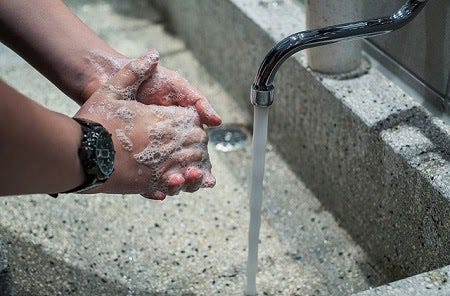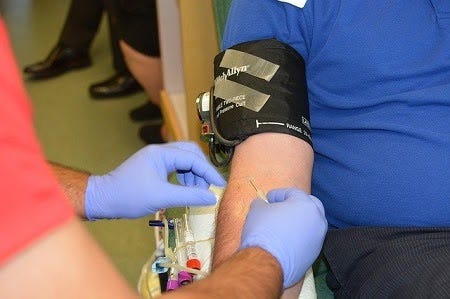Corona checks for the rich, the WHO, and blood donations.
Our advice for these trying times? Uhhh, hydration?
WHAT’S UP YouTube! If only we could muster half of the energy it takes to say that convincingly. Let’s look at what we’ve got today:
The corona stimulus is going to end up benefiting the mega-wealthy too: because that’s just how things work nowadays. Thanks to provision within the CARES Act, those who earn more than $1 million annually are likely to see around $1.6 million down the line.
Trump is suspending funding to the WHO: we’re not sure how, either, since much of those funds are appropriated by Congress. The justification? An investigation into mismanaging the response to COVID-19. It’d almost be funny if it weren’t so catastrophically hypocritical.
Homophobia and blood donations in the time of coronavirus: earlier this month, the FDA eased up on some blood donation guidelines for men who have had sex with men. Critics say that easing isn’t enough, especially when donating plasma could be helpful in treating COVID-19.
California is giving coronavirus relief to unauthorized immigrants: who can expect $500 provided by the state. Considering they were left out of the CARES Act entirely, this kind of response is refreshing to see from a state government.
Get ready or at least pretend that getting ready is something you’re still capable of.
CORONAVIRUS
Rich Americans Are Getting a Stimulus, Too

The CARES Act. When it was first coming into formation, there were big questions about means testing—or deciding whether or not the eventual aid would be universal or divvied out based on income—was appropriate. In the end, the structure seemed to benefit those making less than $99,000 as a single US resident, or $146,500 if you’re the head of a household, or if you file jointly and earn less than $198,000.
Not so bad, right? We’re funneling aid to those who need it most and letting the mega-wealthy get through this with silver-lined pockets?
Turns Out, The Rich Are Going to Reap Benefits, Too
It’s hard to feign surprise at these kinds of things anymore, but as it turns out, the $2.2 trillion-dollar Coronavirus Aid, Relief, and Economic Security Act (CARES) has big benefits for the wealthy.
This essentially comes down to the overhauls in the tax code we saw in 2017, which has a provision that “temporarily suspends a limitation on how much owners of businesses formed as ‘pass-through’ entities can deduct against their non-business income, such as capital gains, to reduce their tax liability.”
This provision will cost the government $90 billion in 2020.
Senator Sheldon Whitehouse (D-RI) and Lloyd Doggett (D-TX) released an analysis indicating that 43,000 tax filers covered by one of the provisions “would see their tax liability fall by a combined $70.3 billion in 2020.” They go on to note that this analysis “shows nearly 82 percent of those who will benefit from that provision make $1 million or more, with 95 percent making over $200,000.”
Tax Loopholes: They’re Bad, Folks!
As Doggett correctly notes, “someone wrongly seized on this health emergency to reward ultrarich beneficiaries, likely including the Trump family, with a tax loophole not available to middle-class families.”
Ideally, a stimulus package like this should provide relief across every aspect of the American economy. Disproportionately favoring the wealthy is, while expected, only going to further the growth of inequality.
Bottom line: If you got your check yesterday, hopefully it helps. Just don’t forget at the cost it came at.
TRUMPOCALYPSE
Trump Suspending Money to the WHO, For What?

The World Health Organization. In retrospect, we may see issues with how the WHO handled the coronavirus outbreak. That’s the reasoning behind Trump cutting their funding while investigating any mishandling of the pandemic, anyway.
Who’s Really at Fault? Probably Not the WHO
The middle of a global pandemic and national emergency probably isn’t the best time to cut funding to humanitarian organizations whose entire existence is to weigh in on problems like this, but hey, we’ll take a look at the evidence anyway.
The claim: Trump says that the WHO opposed travel restrictions from China and other nations. He also says they “pushed China’s misinformation about the virus, saying it wasn’t communicable.”
The WHO’s response: by mid-January, they had started sounding the alarms about the new coronavirus. By January 30th, they had declared the virus a global health emergency. WHO officials deemed it a “global pandemic” by March 11th.
Trump’s response: on January 22nd, after the first case in the U.S., Trump says situation is “totally under control.” On the 29th, a coronavirus taskforce is created. Travel to China is blocked two days after. On February 24th, Trump claims “the Coronavirus is very much under control in the USA” via Twitter.
Responses Aren’t Great
People aren’t happy.
Bill Gates: “halting funding for the World Health Organization during a world health crisis is as dangerous as it sounds.”
Nancy Pelosi called the decision “senseless,” going on to say the “this decision is dangerous, illegal, and will be swiftly challenged.”
A leaked memo shows that some Trump administration officials warned against this decision, as it would likely “cede ground” to China and hinder the global response to coronavirus.
It’s a terrible, stupid decision, the implications of which remain unseen but will undoubtedly be bad news.
HEALTH
It’s Time To End Homophobic Policies Towards Blood Donation

Blood. During a global health crisis, it’s a critically important resource. The need for blood donations hasn’t gone away, but blood drives are being canceled, just as the schools, churches, and other institutions who host them are closing their doors. People who would normally donate may not because of social distancing. In a time like this, it’s all hands on deck—at least it would be, if these practices weren’t mired by homophobia.
A History of Bigotry
In 1983, during the early stages of AIDS epidemic, little was known about HIV which was ultimately the justification for enacting a ban on gay and bisexual men donating blood.
In 2015, that changed somewhat. The FDA placed a new “12-month waiting period,” which was a guideline for how long men should wait after having sex with another man before donating blood.
The guideline has been criticized as being a remnant of bigoted thinking, but the FDA maintained that such guidelines were in place to keep the blood supply safe from HIV.
In early April, that 12-month waiting period was dropped to three months in the wake of a drastic drop in the supply of blood. The FDA says those recommendations will remain in place after the pandemic is over.
Not Going Far Enough
LGBTQ advocates applauded the decision but acknowledge that this doesn’t go far enough.
Blood donors help all kinds of patients: heart surgeries, organ transplants, treating accidents or burn victims, and helping those who battle cancer all require a steady supply of blood. Refusing to let people donate based on sexuality, especially when we have the technology in place to ensure the safety of blood donations, is wrong.
Plasma transfusions could be used to treat coronavirus patients as well. Vox recently ran a piece by Jack Turban, who is unable to donate plasma for an experimental COVID-19 treatment, because of their sexuality.
Bottom Line: This kind of thing is abhorrent normally, but in a crisis like this, it’s especially upsetting to see unfold.
CORONAVIRUS
California Is Providing Aid to Undocumented Immigrants

Governor Gavin Newsom of California announced Wednesday that unauthorized immigrants in the state can get up to $500 of coronavirus relief from the state government.
Aid For Those Most Jeopardized
The crashing economy hurts us all, but in particular, it hurts those without the same access to traditional financial institutions or protections. Undocumented immigrants were left out of the CARES Act entirely and also can’t qualify for unemployment insurance.
This will be given to around 150,000 adults, which is a small portion of the 3 million total population of unauthorized immigrants in the state. But hey, it’s a start.
$75 million is from the state, $50 million is from private philanthropic sponsors.
That money will be given out through a “community-based model of regional nonprofits with expertise and experience serving undocumented communities.”
That method of delivery is interesting to us—could we do something similar for homeless populations around the country, who likely lack access to typical means for dispersing stimulus funds like this.
Bottom Line: A good move from Governor Newsom.
END OF THE LINE...
That’s it for today.

That’s what we’ve got. Remember, we’re only able to do this every day because of readers like you. Drop your friends and family a referral link and help us grow. We’d truly appreciate it.
Have a good one,
The Bread Line
we’re listening to:



